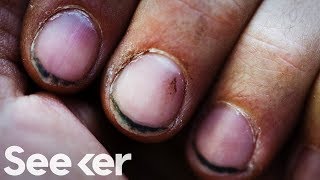Washing your hands may be the best way to keep from getting sick, but in some ways, DIRT does a body good.
预防疾病最好的方法也许莫过于洗手,但在某些方面,污垢对身体也不无裨益。
We've all been taught that dirt is bad for us.
一直以来,我们学到的都是污垢有害健康。
In my Grandmother's house "Cleanliness was next to Godliness" and everything was scrubbed clean and disinfected,
在我祖母家里,“虔诚第一,卫生第二”,所有东西都要经过擦拭和消毒,
but now with new research on the superpowers of the micro biome it may be time to rethink our relationship with filth.
但现在,伴随微型生物群超级力量的最新研究,也许我们也该重新思考一下,我们与污垢之间的关系了。
You may think dirt and soil are interchangeable, they are both a grainy collection of minerals, oils, water, and organic matter.
你可能认为污垢和土差不多,它们都是矿物、油、水和有机物的粒状集合。
BUT soil stays in your backyard while dirt is what follows you back into your house.
但是土留在你家后院,而污垢则跟着你,回到了家。
BOTH have microbes.
两者都有微生物存在。
Germ theory tells us that these microbes can infect our bodies and make us sick,
细菌理论告诉我们,这些微生物可以感染我们的身体,
but we are starting to understand that in our haste to eliminate and defend against disease
让我们得病,但我们渐渐开始明白,在我们匆忙消除细菌和抵御疾病的过程中,

we may have unintentionally "protected" ourselves against the collaborative relationships we need most.
可能无意中将自己“保护”了起来,切断了我们最需要的合作关系。
Yes, over exposure to some microorganisms will make us sick,
是的,过度接触微生物会使我们生病,
but of the thousands of species and up to 6 POUNDS yes POUNDS of bacteria that are living in and on our bodies RIGHT NOW
但是此时此刻在我们体内生活着的微生物种类就有成千上万,总重量多达6磅,是的6磅,
some are critical for our health and happiness.
而有些对我们的健康和幸福至关重要。
The bacteria that live in our bodies, sometimes called our micro biome,
生活在我们体内的细菌,有时称为我们的微生物群,
help us digest food, respond to pathogens, and may even influence our moods.
它们帮助我们消化食物,对病原体做出反应,甚至影响我们的情绪。
Getting dirty once in a while can help repopulate "friendly" bacteria that have been killed off or washed away by our hygiene practices.
我们的卫生习惯也会杀死和清除“友好”细菌,而偶尔把自己弄脏一次会有助于它们的恢复。
Commonly, we're taught to clean ourselves thoroughly to prevent illness, but we could be killing off too much good bacteria.
通常,我们总被教导要彻底清洁自己,以此预防疾病,但同样太多的有益细菌也被同时清除掉了。
Studies show that we need exposure to both friendly and unfriendly bacteria to maintain health and a strong immune system.
研究表明,有益细菌,有害细菌我们都要接触,这样才能保持身体健康,保障免疫系统强大。
Some exposure to disease causing pathogens early in life, helps to build our body's defence keeping us healthy as adults.
在生命早期,我们对于一些致病病原体的接触,有助于帮助我们建立身体防御系统,成人期后才能保持健康。
When our body "fights" a disease, it is activating immune cells in response to a remembered disease agent.
当我们的身体与疾病“对抗”时,它会激活免疫细胞,来应对已知疾病入侵。
The Hygiene Hypothesis suggests that the right amount of exposure to germs and dirt builds our body's library of known diseases,
卫生假说表明,对细菌及污垢的适当暴露,可以帮助我们的身体建立疾病知识库,
and teaches our immune system to remember which microbes, proteins, and viruses are dangerous.
从而我们的免疫系统可以记住哪些微生物、蛋白质和病毒存在危险。
Without this training, our immune system may become hyperactive,
如果没有这种训练,我们的免疫系统可能会过度活跃,
looking for diseases to fight and it may find innocuous aspects of our own biology instead.
到处寻找疾病进行斗争,反而错攻了我们身体健康的部分。
When the body attacks itself, it can cause autoimmune disorders such as asthma and Inflammatory Bowel Disorder.
当自体攻击产生时,自身免疫系统将会紊乱,比如罹患哮喘和炎症性肠病。
An example of this was seen in a study of germ-free mice that had been raised in a sterile environment.
在无菌环境下培育无菌小鼠的研究,为我们提供了一个例子。
The mice were compared to normal mice living in a microbe rich environment.
将无菌小鼠与在富含微生物的环境中生长的正常小鼠进行比较。
The germ-free mice were found to have several immune disorders such as inflammation of the lungs and colon which resemble human asthma and colitis.
无菌小鼠体内见有多种免疫紊乱,如肺部及结肠炎症,类似于人类的哮喘和结肠炎。
These conditions were caused by hyperactivity of a type of immune cell that had been previously linked to these diseases in both mice and humans.
这些紊乱由免疫细胞的过分活动引起,而这些细胞先前就与这些人鼠共患的疾病相关。
Most importantly, the researchers discovered that exposing the germ-free mice to microbes when they were babies,
最重要的是,研究人员发现,将新生无菌小鼠暴露于微生物中,
led to development of a regular immune response and proper defense against disease.
它们可以产生常规的免疫反应,并能适当防御疾病。
So, playing in the dirt as a kid is good for you, and adults, it's not too late!
所以,小时候玩泥巴对你有好处,而成人呢,也还不晚!
Put that hand sanitizer away, go hiking, pet that dog, explore different environments and all that good bacteria. GET MESSY!
把洗手液收起来,去远足,养条宠物狗,探索不同的环境,接触所有有益的细菌。去把自己弄脏!
Remember, in our haste to make our living conditions more sterile, we may be making ourselves sick.
记住,在我们匆忙净化我们的生活环境时,我们可能正在让自己生病。
Hey all, love science in your day?
嘿,平日里,你热爱科学吗?
Make sure you subscribe and check out some of these microbes living in the driest place on earth on our sister show, Science in the Extremes.
请务必订阅和观看我们的姊妹篇,Science in the Extremes:有些微生物生活在地球上最干燥的地方。
Fun fact: If you're craving dirt, you might be pregnant!
趣味知识:如果你渴望污垢,那么你可能怀孕了!
The desire to eat dirt is called geophagy, and it is commonly observed in children and pregnant women.
吃土的欲望被称为食土症,通常见于儿童及孕妇 。
Weird! Thanks for watching Seeker.
奇怪!感谢收看Seeker。


